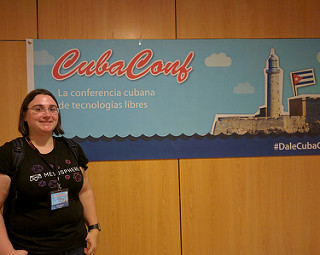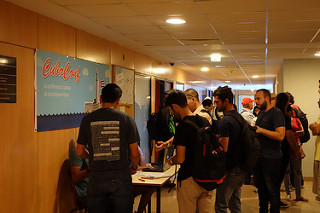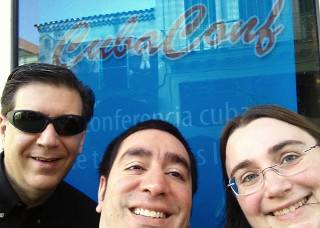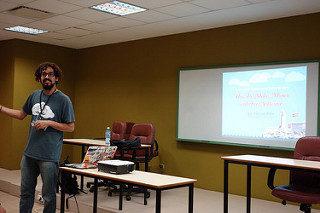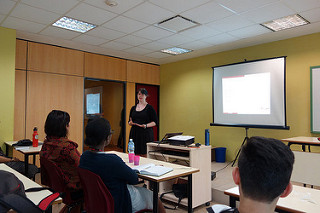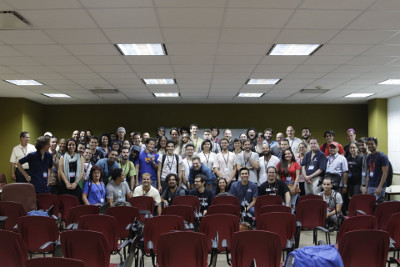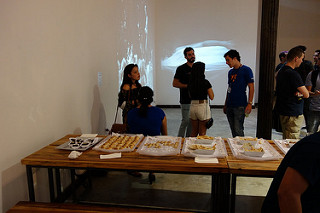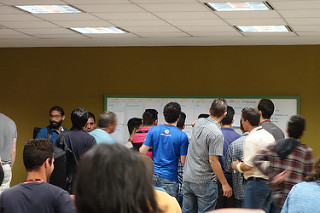I spent the second week of November in Havana, Cuba for CubaConf 2017.
It’s an open source conference, and so much, more as their website explained:
CubaConf, is an international conference about free software and open technologies that will have its second edition in La Habana from November 7th to 9th, 2017. CubaConf is a meeting from the international community of enthusiasts of the free technologie’s world, peer to peer focused and collective development. It seeks the participation of people with different profiles and diverse geographical locations.
From the organization of the conference, it is aimed at the diversity of both topics and projects, as of its participants, so the participation of women, minority groups, in these activities is crucial to build new inclusive spaces of knowledge and dialogue about technology. The main idea is to know people experience and organizations who work with and in free software, with old hardware technologies and little or slow bandwidth, to talk about how free software can help developing countries.
I learned about the conference from and then tagged along with the OpenNMS crew, Tarus Balog and Alejandro Galue, which I was grateful for. Last week Tarus wrote a great blog post about the conference here: 2017 Cubaconf. It was nice having folks to walk with as we wandered through the streets of Old Havana to find the venue on Tuesday morning. The format of the conference was a day of planned conference talks, one day of unconference and then a workshop day.
I joined them to give my Open Sourcing of Infrastructure talk, but this is one conference where I’m certain I learned more from the attendees and environment they work in than they ever did from me. The day began with a keynote from Ismael Olea who came to the conference from Spain where he participates in HackLab AlmerÃa. His talk was in Spanish, and he spoke quickly, but thanks to verbose slides (available here) I was able to make out the gist of his talk. AlmerÃa is not a major global city, but they’ve worked to build a thriving community through events and online built around giving people the autonomy to self-organize and do whatever they want, as long as it aligns with their ethos of technological, social and creative experimentation. The broad, generalist approach echoed much of what I heard from Josh Simmons at Linux.conf.au earlier this year: when you live in a less densely populated area, multidisciplinary groups are key to success. The added element of self-organization definitely appealed to the Cuban audience, which was a constant theme throughout the conference.
The first talk after the keynote I attended was by Valessio Brito who presented a career path on how you can make money doing open source software. He outlined opportunities for working in support, consulting, customization and development, and stressed the importance of building an open source portfolio. Even once you’re hired, he expressed the value to your career of staying involved with the open source community instead of being overtaken by the tasks internal to the company where you work. Of course as a developer advocate I’m thrilled when our internal engineers express an interest in being a part of our community, so it was nice to hear from a third party too.
My talk on The Open Sourcing of Infrastructure was next. This is a talk I’ve given at a few different places now, and I think I got the most interesting response yet from this Cuban audience. The talk stresses the importance of controlling your data and resources instead of trusting a third party company to do it, and this really resonated. For the Cubans I met, the ethos of free software (not just open source) was incredibly important. I learned quickly while there in Havana that they have a very resourceful, DYI culture that values the ability to have control of your resources. While reading up on this phenomena upon returning home, I found this article from PBS News Hour in 2015, How communism turned Cuba into an island of hackers and DIY engineers. Had I been more aware going in, I could have shifted my talk away from convincing them to use open source infrastructure tooling, they were already convinced! If I were to do it over, I think I would have focused on how they could do it, instead of the specific technologies (OpenStack, DC/OS, Kubernetes, etc) being a single slide of recommendations.
Unfortunately my talk slot overlapped with my friends from OpenNMS! But I’m sure they did a fabulous job.
At lunchtime we walked over to the nearby Casa de Ãfrica where they had outdoor event space for us to enjoy sandwiches. It was there that I met an engineer who was deploying DC/OS for a bank in Mexico and several folks from the US and Europe whose attendance at the conference was deeply tied to the spirit and message that free software brought, not just the open source aspect of it. It was interesting to learn their perspectives and what brought them there to Cuba.
After lunch I went to a talk by Christian Weilbach on “Free data and the infrastructure of the commons.” Companies control vast amounts of data today, most obviously by companies like Google and Facebook, but generally by most companies who have a technical presence and customers. He explained the risks here, and his plea was to work to adopt open source methodologies to the free access of data. He didn’t have the answers, but was keen on seeing us get there because of how important data is in today’s world. Indeed, a quote I took from the talk centered around the future money being in data, not in the technology stacks which are being commoditized.
The final talk of the day I attended was by Molly de Blanc on “Freedom Embedded: Certifying fully free hardware.” We’ve met at a few conference, so it was a wonderful surprise to see her at this conference and get the opportunity to catch up. Her talk began with some background of the Free Software Foundation (FSF), where she works. I find their perspective on free software to be on the extreme side, but her talk was about their “Respects Your Freedom” hardware product certification, which is actually really cool. They’re seeking to document hardware that runs with 100% on free software, documenting their criteria for certification here. She also mentioned h-node.org during her talk, which I wasn’t familiar with.
Then we had the conference group photo! Not everyone made it in the picture, but it was a decent chunk of the conference attendees.
That evening we made our way to the evening social held at a gallery in Old Havana. They served light appetizers and offered an open bar, where I got to enjoy some rum on the rocks. Rum isn’t usually my drink, but I was in Cuba! That event was where I was able to speak with a developer from cuban.engineer where I learned a bit about how they do software development in Cuba. At his company they rely heavily upon their local LAN instead of having internet access in the office, and collaborate on a local GitLab instance. Collaboration and syncing upstream and online is done, but it’s simply not a part of their constant daily activity. This is in sharp contrast with every software project I’ve ever worked on, being a remote employee for over a decade and involved with online software communities since 2001, internet access is essential to my ability to collaborate. It’s a very different environment than I’m used to, and it was fascinating to learn how they make it work.
Wednesday began with a keynote by Dr. Mixael S. Laufer, who I had the pleasure of meeting the day before. The organization he belongs to seeks to equalize access to healthcare, and drawing from similar tenets of open source and Maker movements, encourages a DYI approach to healing. Again, giving the culture in Cuba this was a fantastic message and I’m sure one they already work towards, but it was a fascinating topic for me to learn more about.
The rest of the day was reserved for the unconference, which began by people writing down and pitching their ideas, and attendees voting on sessions which then landed on a schedule put together there on site.
The first discussion I ended up in for the unconference was from Zak Rogoff, who told us a tale of how the Free Software Foundation tried, and failed, to fight back against DRM entering web standards. He recounted the grass-roots campaigns they attempted. I have to admit that I continue to be put off by the campaigns that the FSF launches because I do find them to be on the extreme or childish side. Still, with this campaign they had a very firm foundation in something I believed in, and it’s a shame they failed to get the attention of me and others like me. One of the great things they did do was partner with the EFF and Cory Doctorow which led to An open letter to the W3C Director, CEO, team and membership. I believe they would have had more success if more of these strategic partnerships with organizations I hold in high regard had been made, along ones which could have spoken more directly to the serious challenges DRM presents to security and accessibility. His conclusion was the same. I hope the FSF takes this lesson he presented to heart, for the most part they are fighting the good fight, I’d just like to see a better approach.
Lunch was next! I was able to spend more time chatting with attendees, but unfortunately by the time we were wrapping up in the mid afternoon I wasn’t feeling my best. I had to depart and head back to the AirBnB for the rest of the day, with the exception of a stop at the pharmacy and a futile attempt to eat some chicken soup for dinner. I’m even more disappointed to report that being ill took me completely out of the game on Thursday. That means I missed the women group photo! But it was nice to see a decent representation of women at the conference, I wish I had made time to meet with more of them.
Huge thanks to the organizers of this event who made me feel so welcome. In spite of not being able to attend all of them, I appreciated the existence of social events each night and had a nice time chatting with people throughout the event.


